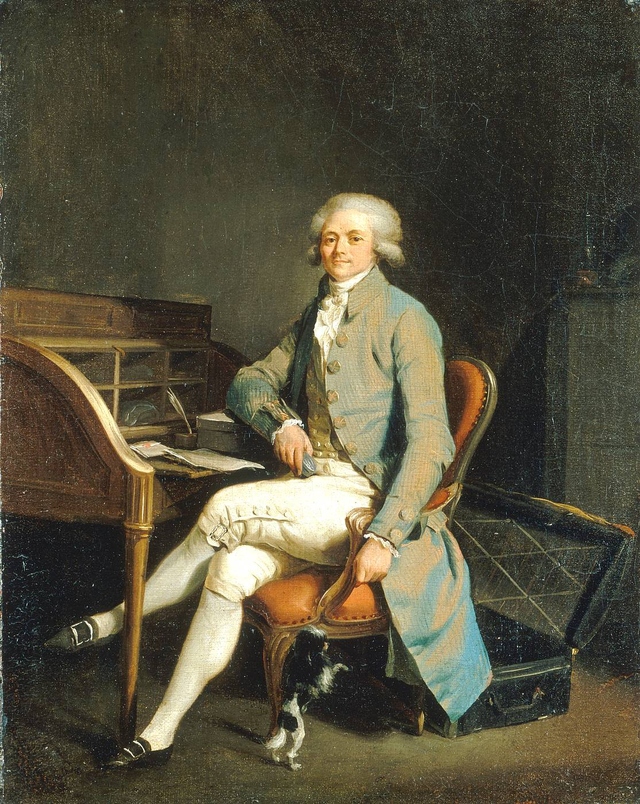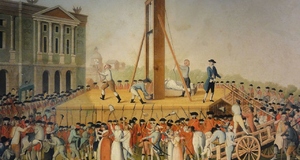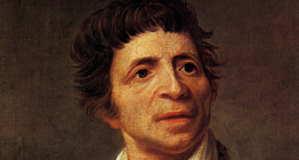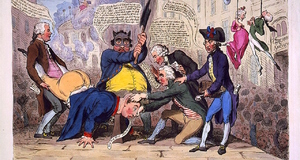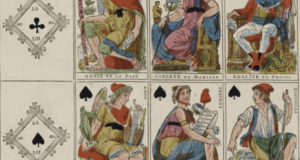An Elephant Man's VirtueThe Historical Life of Maximilien Robespierre's Reign of Terror
By
2016, Vol. 8 No. 01 | pg. 1/2 | »
IN THIS ARTICLE
On the 5th of February, 1794 (18 Pluviôse Year II), Maximilien Robespierre addressed the National Convention thus, And ever since, a debate has ensued regarding both the man himself and his acts as the virtual head of the Committee of Public Safety. This debate has found its way not only in historical circles, but also in philosophy, political theory and sociology. Throughout its historical life, the Jacobin Republic, under the dominance of the Montagnards (July 1793 - July 1794), has been praised, criticized and slowly brushed under the carpet. Its legacy, which at one time was debated furiously, has now more or less lost significance, even amongst the radical Left of this post-modernist, Fukuyamaist2 political milieu. This article looks to trace the life of Robespierre and his Terror through the lens of various strands of historiographies. In doing so, I take up some of the major historians3 who have written extensively about the same. The article also attempts to trace the nature of the Reign of Terror through its achievements and excesses. It is most interesting to note, as many historians have put forth, that the politico-historical hero of the French Revolution was a man like Robespierre, a person that few of his contemporaries might have foreseen as the face of the Revolution.4 Finally, I discuss whether or not the Robespierrian-Jacobin legacy should remain relevant today, at least for the radical Left. I: The Life of RobespierreMaximilien François Marie Isidore de Robespierre5 was born on 6 May 1758 in Arras, Artois province of northern France. His was a family of lawyers, both his father and grandfather being barristers. His childhood, as recounted by his sister, was spent mostly amongst women–aunts and sisters–who pampered him. He did not have an extravagant lifestyle and his humble origins might have led, as Furet and some others argue, to his sincerity and incorruptibility as a politician in later life. As David Thompson describes him,
But perhaps Slovenian Marxist philosopher, Slavoj Žižek, in his book In Defence of Lost Causes, elaborates a more tasteful description,
The paradoxical Elephant Man thus went on to acquire a taste for classics (especially Rousseau) in his Lycée Louis-le-Grand in Paris. This began developing his beliefs about ‘popular will’ and ‘virtue’ as concepts for politics. These concepts were to greatly influence him henceforth.8 Professionally, as Rudé notes, Robespierre was a “poor man’s advocate.” He had relatively moderate presence in Arras’s public sphere–but nothing that could be traced back in terms of a pointer to his popular rise in 1793. Eventually, he was elected to the Estates-General in 1789 to represent the Third Estate from Arras. In 1971 he joined the Jacobin Club with full devotion to their cause. Subsequently he gained importance in the Jacobin circles as the chief spokesperson for the Montagnards in the National Convention; he passionately countered the Gironde dominance over the Convention and influenced, though not directly took part9, in the purging of the Gironde. It was in July of 1793 that Robespierre gained his highest office as a member of the Committee of Public Safety, succeeding Danton10, and subsequently gaining virtual control over the Committee.11 By now he believed that the Revolution, which he believed to be threatened, could only be upheld by purging the remnants of the aristocracy through the power of a strong centralized government with sans-culottes’ aid.12 Thus was launched what came to be known as The Reign of Terror. II: Legislation of Robespierre's CommitteeA set of laws and legislations was passed through the year, which set the tone for the Jacobin Republic – true and authentic radicalism. According to a Law passed on 3 June 1973, the property of all émigré noblesse13 and the Church was seized; this was to be distributed amongst the common people or the sans-culottes. Later on 10 June 1793, a law redistributed all common lands (under seigneurialism) amongst the people who lived close to it. On 17 June 1793, the Church became part of the state machinery by law. The State determined the roles of the church. Each citizen was to be registered with the state through and in correspondence with the local congregation of which s/he was a member. At the same, Robespierre rejected the Cult of Reason, as instated and propagated by the likes of Hébert, Chaumette, Fouché et al. He introduced the Cult of the Supreme Being (Deism) in June 1794 to counter the Hébertist de-Christianisation. He also instituted the festival of the Supreme Being and radically constitutionalized the clergy. Militarily, the Committee of Public Safety made huge achievements. In August 1793, the levée en masse or universal conscription was introduced for the first time in the history of the world. The Committee, through the genius of Carnot, was able to mobilise the whole nation for the Revolutionary War. Thus, decisive victories were won by the French army against virtually the whole of Europe14, which had declared war on France. However, two key laws stand out in characterizing the Reign of Terror: The Law of the General Maximum and the Law of the 22 Prairial15 (=10 June). Both were two sides of the same coin– that of Terror. The former was the economic face of the Terror, which fixed the prices of many goods of daily consumption (such as bread, soap, meat, cloth etc). The latter was the politico-legal face of the coin. According to the Law of 22 Prairial, all enemies of the Republic (equated with the enemies of the Revolution) would be brought before the Revolutionary Tribunal and tried for treason, with only one punishment– the guillotine. The right to be represented by an attorney was taken away from all ‘suspects’ and so was their right to be heard by the judges. This was seen as an extension of sans-culottesism into the state machinery by the sans-culottes and even the enragés. It is estimated by Norman Hampson that 2,639 capital sentences were carried out during this period, of which 1,515 happened in June-July 1794.16 Furet goes on to put forth that 8,000 suspects were locked up in Paris’ prisons, awaiting the guillotine on 10 Thermidor Year II (27 July 1794).17 However, although most of his opponents were tried under the Law of the 22 Prairial and executed, Robespierre himself faced a conspiracy in the National Convention where a group of dissidents finally toppled him and put him to the guillotine according to the same laws. It is thus, very interesting and most complex a phenomena that the Reign of Terror was. On one hand, it had ensured that the Republic/Revolution would be protected from “both internal and external enemies” and a virtuous Republic was established. On the other, it led to the first state-led terror in human history, killing many citizens in the name of the Revolution and General Will. This is why historians across time have had varied opinions regarding the same. III: The French RevolutionIf one were to look at the historiography of the French Revolution, the statement “every history is a history of the present” seems to be true. The reception of the Revolution has been closely linked to the political events and struggles since the time. Slavoj Žižek sums up the general trends of historiography of the French Revolution thus,
This however needs some background to be understood in its full weight and taste. We must delve into the contemporary and pre-republican sources to fully understand the rise of such a political phenomena. Abbé Sieyès and Marat had two opposing yet similar views regarding the political structure required for the natural state of Man to exist. Abbé Sieyès says that “(it is)…necessary to use force to bring forth (what is) right (for the people).”20 Marat on the other hand, argued that the people couldn’t be trusted to rule themselves. He recognized the need for a leader, “someone bold who would put himself at the head of the malcontents and rally them (the people) against the oppressor, some great character who would captivate the people, someone wise who would direct the actions of an unbridled, floating multitude.” This clearly laid the ideological grounds for the Jacobin Republic and eventually Robespierre and the Terror. However, contemporary historians of the Revolutions had a different opinion. Edmund Burke, an Irish aristocrat, argued that it was the Aristocratic Revolution that laid the base of the French Revolution in 1789. But the Revolution was later hijacked by mobs, which Burke calls the ‘swinish multitude’. Abbé Augustin Barruel counts the likes of the Jacobins in those educated people who “provoked” the common masses to go against the ancient regime–which according to him had little problems. Barruel holds the leaders of the Revolution “responsible” as “criminals.” Later historians of the nineteenth century, who are also termed the Liberal Historians, write in the 1830s and 1840s. They mostly support the ideas of the Republic and Democracy. However their support ends with the beginning of July 1793, as Robespierre comes into power. François Auguste Marie Mignet21 and Madame de Stael are prime examples of such historians. However, one exception in the form of Adolfe Thiers does exist. Thiers is an admirer of Robespierre and argues that it is only through radical Jacobinism that a Republic could have been (and can be) brought about in a monarchical state. He also accuses the Gironde for being too soft towards the monarchy and creating hurdles for the execution of Louis XVI and Marie Antoinette. The later Idealist-Romanticist Historians like Carlyle, Michelet, Quinet and Louis Blanc were mostly weary of the Robespierreist regime. Carlyle describes Robespierre’s Committee of Public Safety as “a strange set of Cloud-Compellers the Earth never saw.” and loathingly demonizes Robespierre as “sea-green incorruptible.”22 Most of the historians of this period were reactionary, owing to the changed regimes in France under Louis Napoleon III. Some of them like François Guizot, started out as outright radicals, but ultimately turned reactionary. Then came the historians of the Third Republic of 1871. They hold divided opinions on the Robespierrian legacy. Alphonse Aulard denounced monarchy and Robespierre in the same breath. He argued that the state should be in the hands of the people; state power should not be concentrated in the hands of a few. Hippolyte Taine subsequently broadened this attack on Robespierre, even saying that Robespierre had “a cat’s physiognomy, which was at first that of a worried…household cat; then the ferocious one of a tiger-cat… ”23 The Marxist Historians shifted the trend and gave an analysis in favour of the Terror. Both Mathiez and Lefebvre admired Robespierre deeply. They wrote in the 1920s-1960s, a period of Stalinist politics. Thus, a great parallel was created between the Reign of Terror in 1793 and the Red Terror in 1919 and also Robespierre and Stalin, where the latter was justified through the former. However, Albert Soboul points out that there were problems with the revolutionary government, which are also noted by George Rudé. Soboul acknowledged that
At the same time, he points out that various issues like the addressing of popular sovereignty, in the name of which Robespierre claimed to have exercised power: voting rights, he says, were more and more curtailed; women were removed totally from the political sphere through various decrees and laws; and the various societies that existed outside the Montagnard purview were abolished completely. Trotskyite Marxists identify the Terror as the founding crime of bourgeois universe of law and order, which allows citizens to pursue their interests in peace. However, as Žižek points out, this is a) factually wrong; and b), this wasn’t a case of “systemic violence” (as exists in the bourgeois universe) or even “state founding violence” but a case of “divine violence”25, as Walter Benjamin describes these forms of violence. But on the whole, the Marxists recognized the importance of Jacobinism in the course of the French Revolution as a key to the founding of democratic and liberal ideas in society. The Revisionist School, however, took a U-turn on Robespierre and the Terror. Alfred Cobban tried to suggest that the violence of the French Revolution was completely unnecessary and avoidable as was the case in England. However, he conveniently forgets the Cavaliers and the Round-heads and the wars led by Cromwell against the Crown. Hard Revisionists or Neo-Conservatives like François Furet hold that the enlightened liberalism of the French Revolution, in 1793, transformed itself into regressive Terror. He argued that it was yet another absolutist regime in the guise of a republic. Furet goes to the extent of saying that the base for the despotic rule of Napoleon (as characterised by Soboul) was laid by Robespierre himself. Keith Michael Baker argues that the Terror was the elaboration of three discourses26– Will, Justice and Reason. The Neo-liberalists escape the debate altogether by arguing that the French Revolution was more than just the Jacobin Republic. They praise the Gironde Republic, the Constituent Assembly and the Legislative Assembly as the key period in the Revolution. They locate this period as one where liberal ideas are first implemented. Besides this, the Neo-liberals (like many others) critique Robespierre on ethico-political grounds. They question his unwillingness for fair trials and not showing any clemency to the ‘suspects’. To this accusation, Robespierre shouts to us from the pages of history, To punish the oppressor of humanity: that is clemency; to forgive them is barbarity. The rigour of tyrants has the rigour as its sole principle: that of the republican government is based on benefice.27Continued on Next Page » Suggested Reading from Inquiries Journal
Inquiries Journal provides undergraduate and graduate students around the world a platform for the wide dissemination of academic work over a range of core disciplines. Representing the work of students from hundreds of institutions around the globe, Inquiries Journal's large database of academic articles is completely free. Learn more | Blog | Submit Latest in History |

